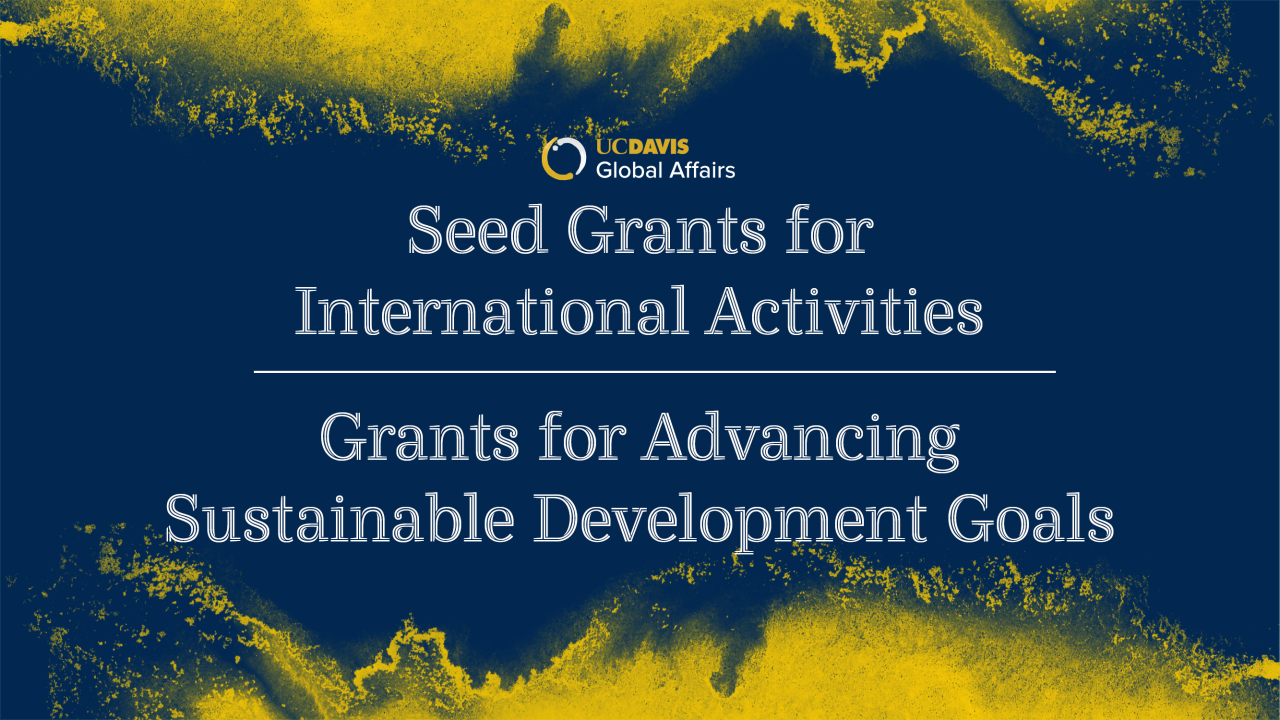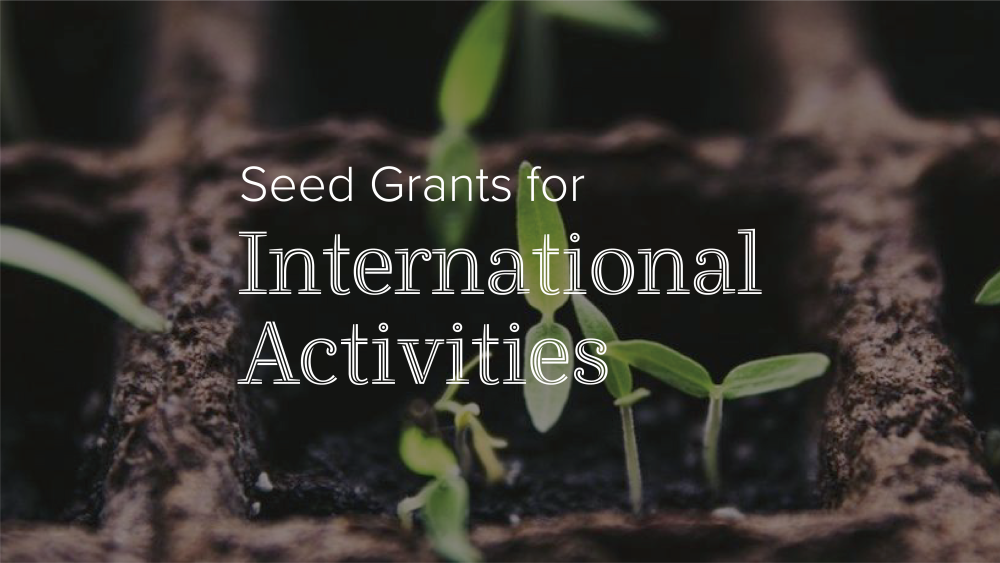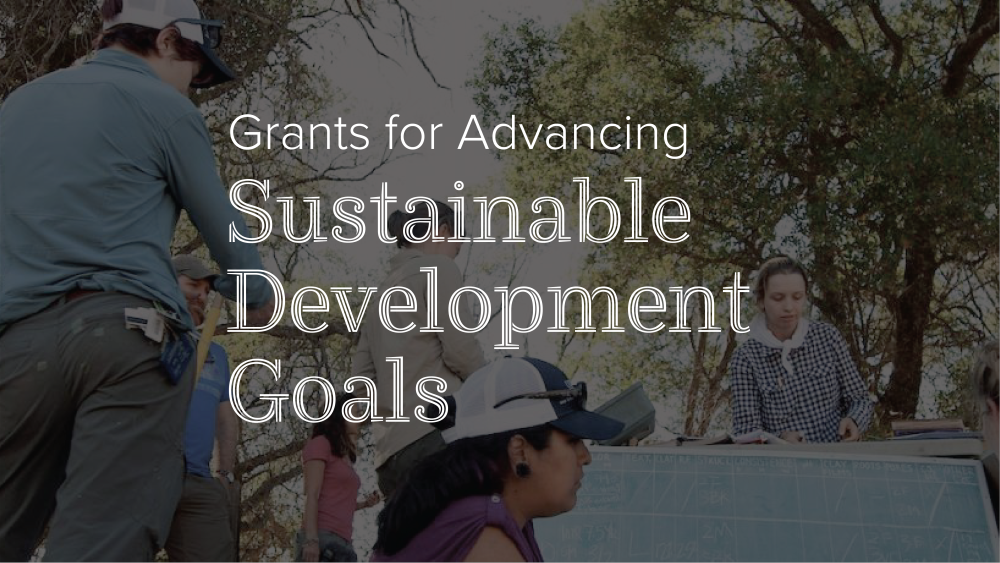
Faculty Receive Grants to Advance Global Engagement
We are pleased to announce the recipients of two sets of grants for interdisciplinary work that advances UC Davis’ strong commitment to solving global challenges: Seed Grants for International Activities and Grants for Advancing Sustainable Development Goals.

2022-23 Global Affairs Seed Grants for International Activities Projects
Seed Grants for International Activities are offered in partnership with UC Davis colleges and schools, the Office of Research and the Office of Diversity, Equity and Inclusion, to faculty taking on innovative research, service, and engagement projects around the world. These projects foster long-term international research collaborations, create innovations in internationalizing the curriculum, and grow or build global partnerships. Since 2001, the program has supported 260 diverse projects, generating significant partnerships, research outcomes, and external funding.
This year’s 11 projects bring together more than 19 researchers across UC Davis and collaborating institutions worldwide.
Molecular Underpinnings of Alcohol-Associated Liver Disease (Asia)
Fawaz George Haj (Professor and Vice-Chair, Nutrition, College of Agricultural and Environmental Sciences)
This project is funded in part by the UC Davis-Taiwan Collaborative Research Fund in memory of Former Chancellor Larry Vanderhoef.
Improving the Resiliency of Drinking Water Systems in Latin America (Latin America and the Caribbean)
Frank Loge (Professor, Civil and Environmental Engineering, College of Engineering)
Food Security through Resource Recovery: Assessment of Urine Processing Technologies for Container-Based Sanitation (CBS) Services in Guatemala (Latin America and the Caribbean)
Heather Bischel (Associate Professor, Civil and Environmental Engineering, College of Engineering), Irwin Donis Gonzalez (Postharvest Systems Engineering Specialist in Cooperative Extension, Biological and Agricultural Engineering, College of Engineering)
Sustainable Water Management in a Water-Limited World: UC Davis and IHE Delft (Europe)
Nicholas Pinter (Shlemon Professor, Earth & Planetary Science, College of Letters and Science), Helen Dahlke (Associate Professor, Land, Air, and Water Resources, College of Agricultural and Environmental Sciences) and Thomas Harter (Professor and Specialist in Cooperative Extension, Land, Air, and Water Resources, College of Agricultural and Environmental Sciences)
Human Rights and Reparations in African & African American History: Lessons from South Africa for California (Africa)
Shingirai Taodzera (Assistant Professor, African American and African Studies, College of Letters and Science) and Benjamin Weber (Assistant Professor, African American and African Studies, College of Letters and Science)
State Paralysis: The Impacts of Procurement Risk on Government Effectiveness
Diana Moreira (Assistant Professor, Department of Economics, College of Letters and Science)
Transatlantic Digital Humanities Workshops on the Democratic Pivot and Modern Media: Mapping Democratization, Decolonization, and Refugee Regimes in Postwar Europe (Europe)
Jaimey Fisher (Professor, German and Cinema and Digital Media, College of Letters and Science)
Comparative International Research in Education Policy to Address Educational Inequities
Christina Murdoch Mills (Executive Director, Center for Applied Policy in Education, School of Education), Thomas Timar (Professor Emeritus and CAP-Ed Policy Fellow, School of Education)
Pediatric Scrub Typhus in Nepal: a New Research Collaboration with Kanti Children’s Hospital (Asia)
Kristen Aiemjoy (Public Health Sciences, School of Medicine)
Investigation of Rhinoceros Bloodborne Pathogens and other High Consequence Zoonotic Viruses at Wildlife Corridor Restoration Sites in South Africa (Africa)
Brian Bird (Associate Adjunct Professor of Emerging and Zoonotic Disease, One Health Institute, School of Veterinary Medicine) with Leith Meyer (Center for Wildlife Veterinary Research, University of Pretoria, South Africa)
Developing Novel Post-Consumer Food Scraps as a Feed Source for Commercial Village Poultry in Uganda (Africa)
Maurice Pitesky (Associate Professor in Cooperative Extension, Population Health and Reproduction, School of Veterinary Medicine), Christopher Simmons (Department Chair, Professor, Food Science and Technology, College of Agricultural and Environmental Sciences) and Yanhong Liu (Associate Professor Animal Science, College of Agricultural and Environmental Sciences)
This project is funded in part by the Gurdev S. and Harwant K. Khush Seed Grant.

2022-23 Grants for Advancing Sustainable Development Goals Projects
Sustainable Development Goals grants are offered in partnership with the Office of Diversity, Equity and Inclusion, Sustainability and Grand Challenges to faculty promoting multidisciplinary collaborations focused on advancing one or more of the United Nations Sustainable Development Goals (SDGs). The SDG grants advance inclusive global dialogues and projects that contribute to the achievement of the SDGs.
This year’s five projects bring together more than 15 researchers across UC Davis and collaborating institutions worldwide.
Multilayered Community-Based Assessment of SDGs in Rural Zimbabwe (Africa)
Ryan Meyer (Executive Director, Center for Community and Citizen Science, School of Education), Sarah McCullough (Associate director, Feminist Research Institute, Office of Research) and Pamela Reynolds (Associate Director, UC Davis Data Lab, University Library)
Their combined efforts will help reach SDG 1: No Poverty, SDG 2: Zero Hunger, SDG 3: Good Health and Well-Being, SDG 4: Quality Education, SDG 5: Gender Equality, SDG 6: Clean Water and Sanitation, SDG 7: Affordable and Clean Energy, SDG 10: Reduced Inequalities, SDG 13: Climate Action, SDG 15: Life on Land, and SDG 16: Peace, Justice, and Strong Institutions.
Place-Based, One Health Experiential Education: A Platform for Inspiring Action in Tackling Complex Global Challenges to Achieve SDGs
Jennifer Lane (Field Veterinarian, School of Veterinary Medicine), Michael Wilkes (Director and Professor, Internal Medicine, School of Medicine) with Saengduen Moonsom (Mahidol University)
Their project will contribute to the advancement of SDG 2: Zero Hunger, SDG 3: Good Health and Well-Being, SDG 4: Quality Education, SDG 6: Clean Water and Sanitation, SDG 14: Life Below Water, and SDG 15: Life on Land.
Comparative Analysis of Framing (De)criminalization of Abortion in Mexico and the U.S.: Advancing UN Sustainable Development Goals (SDGs) (Latin America and the Caribbean)
Natalia Deeb-Sossa (Professor, College of Letters and Science) with Deborah Billings (University of South Carolina) and Veronica Cruz Sanchez (Centro Las Libres)
Their project aims to develop greater alignment for achieving SDG 3: Good Health and Well-Being, SDG 4: Quality Education, SDG 5: Gender Equality, SDG 8: Decent Work and Economic Growth, SDG 10: Reduced Inequalities, and SDG 16: Peace, Justice, and Strong Institutions.
Food Security and Compounded Disaster Resiliency in a Community Kitchen in Merida, Mexico (Latin America and the Caribbean)
Amanda Crump (Associate Professor, College of Agricultural and Environmental Sciences), Ana Zepeda (Ph.D. student, Geography Graduate Group, College of Agricultural and Environmental Sciences) with Dolores Molina Rosales (Ciencias de la Sustentabilidad)
Their project aims to support SDG 2: Zero Hunger, SDG 5: Gender Equality, SDG 10: Reduced Inequalities, and SDG 11: Sustainable Cities and Communities.
Rural Justice and Women's Empowerment in Colombia (Latin America and the Caribbean)
Raquel Aldana (Professor, School of Law), Holly S. Cooper (Lecturer and Co-Director, Immigration Clinic, School of Law) and Amagda Perez (Lecturer and Co-Director, Immigration Clinic, School of Law)
Their combined efforts work towards achieving SDG 4: Quality Education, SDG 5: Gender Equality, SDG 10: Reduced Inequalities, and SDG 16: Peace, Justice, and Strong Institutions.
Made Possible by Donor Support
About Global Affairs at UC Davis
Global Affairs brings the world to UC Davis, welcoming more than 10,000 international students, scholars and leaders, and hosting programs that inspire global curiosity, understanding and engagement. Compelled by the valuable outcomes of thinking globally, we make transformative opportunities a reality by supporting the thousands of students and faculty learning and researching globally—and by facilitating collaborations that tackle the world’s most pressing challenges through more than 150 global partnerships.
Putting our vision of a UC Davis community that engages, thrives, and leads in this interconnected world into action, Global Affairs is in pursuit of an ambitious goal: Global Education for All.